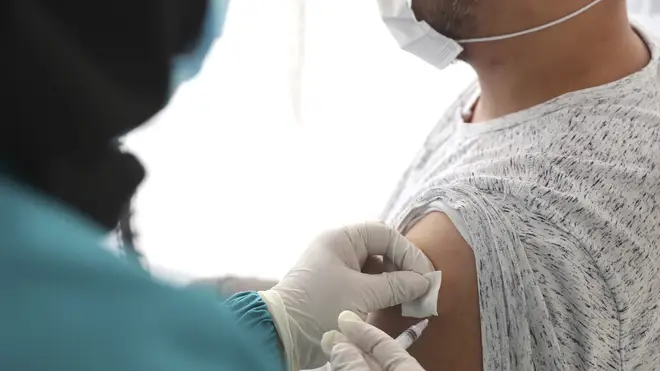
Oli Dugmore 4am - 7am
14 January 2021, 05:46

High street pharmacies will begin rolling out Covid vaccines, as the virus death toll across the UK climbed above 100,000.
Boots and Superdrug branches will be among the six stores across England which will be able to administer the jabs from Thursday while the Government aims to hit its target of vaccinating all people in the four most vulnerable groups by the middle of next month.
Andrews Pharmacy in Macclesfield, Cullimore Chemist in Edgware, north London, Woodside Pharmacy in Telford and Appleton Village pharmacy in Widnes will be in the first group to hand out the injections, alongside Boots in Halifax, and Superdrug in Guildford.
Boris Johnson also told MPs that distribution "will be going to 24/7 as soon as we can" but said supply of doses remained the main barrier.
The Scottish Government published its vaccine delivery plan on Wednesday evening, including details of how many doses it expects to receive for each week until the end of May, prompting a row with London, which has declined to publish its numbers.

JVT: We will never eradicate Covid but it will be vaccine-preventable
The six pharmacies have been picked because they can deliver large volumes of the vaccine and allow for social distancing, and Health Secretary Matt Hancock said it was "fantastic" that jabs would be available on the high street.
"Pharmacies sit at the heart of local communities and will make a big difference to our rollout programme by providing even more local, convenient places for those that are eligible to get their jab," he said.
By the end of the month more than 200 community chemists will be able to give vaccines, according to NHS England.
The pharmacies join the 200 hospitals, around 800 GP clinics and seven mass vaccination centres where jabs are already being handed out.

Johnson: Vaccines will be offered 24/7 "as soon as we can"
The expanded vaccination service in England comes as the daily reported UK death toll reached a new high on Wednesday, with 1,564 fatalities recorded within 28 days of a positive test.
The latest figures meant the grim milestone of more than 100,000 deaths involving coronavirus has now been passed in the UK, according to official data.
The Prime Minister warned hospital intensive care units (ICUs) face being overwhelmed unless coronavirus rates are brought under control, with the latest official figures showing more than 36,000 people are in hospital with coronavirus, including almost 3,500 on ventilation.
He told MPs: "If you ask me when do we think that the ICU capacity is likely to be overtopped, I can't give you a prediction for that.
"But all I can say is that the risk is very substantial and we have to keep the pressure off the NHS and the only way to do that is to follow the current lockdown."
Mr Johnson told the Commons Liaison Committee that "the situation is very, very tough indeed in the NHS" and "the strain is colossal" on staff.
The Scottish Government published a 16-page document setting out how it intends to vaccinate 4.5 million people, including 400,000 a week from the end of February.
It set out the supply of vaccine from Pfizer, AstraZeneca and Moderna from the start of April that it expects to receive each week.
This angered ministers in London, with a senior Government source warning: "Publication of numbers like these risks suppliers coming under pressure from other countries.
"These vaccines are a finite resource and as we have said throughout - supply is the limiting step."

Boris Johnson says the risk of intensive care units being overwhelmed is "very substantial"
Amid the warnings of struggling hospitals, the Government's top scientist also warned the country is "in for a pretty grim period" of deaths which will not "reduce quickly".
Chief scientific adviser Sir Patrick Vallance said: "The daily numbers jump around a bit but I think we are in a position now - when you look at the number of infections we've had over the past few weeks and how this is likely to continue, so I don't think they're going to drop very quickly - that I'm afraid we're in a period of high death numbers that's going to carry on for some weeks.
"It's not going to come down quickly even if the measures that are in place now start to reduce the infection numbers.
"So we're in for a pretty grim period, I'm afraid."
In his two-hour questioning from a committee of MPs, the Prime Minister also acknowledged concerns about a new strain of coronavirus from Brazil, but stopped short of promising a travel ban on the South American country.
"We already have tough measures ... to protect this country from new infections coming in from abroad," he said.
"We are taking steps to do that in respect of the Brazilian variant."
Meanwhile, a new study has found that Covid infection provides some immunity for at least five months, but people may still carry and transmit the virus.
The first report from Public Health England's Siren study found that antibodies from past infection provide 83% protection against reinfection for at least five months.
This suggests that people who contracted the disease in the first wave may now be vulnerable to catching it again.